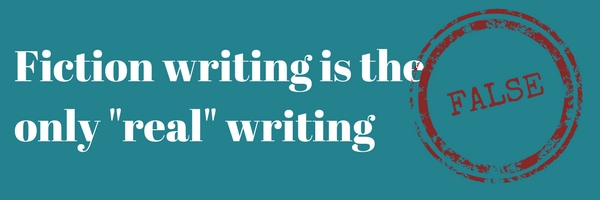
I recently joined a writing club at my neighborhood library. About 12 of us sat around the table and we took turns introducing ourselves. I decided not to tell the others I am a copywriter. Mainly because it's surprising how many people don't know what a copywriter does. And secondly, because fiction writers don't count writing for businesses as "real" writing.
One woman across the table from me introduced herself, giving her real name and her pen name. She then went on to tell us she self-published 30+ books written in a couple different genres, mostly romance and Christian drama. Everyone around the table pumped her for information. Who is your publisher? How did you get published? How much money do you make off sales? What about royalties? This woman, we'll call her Jane, explained her day job was a switchboard operator at a local hospital because she couldn't afford to write full time. She only made about $300 per month on book sales and another $100 on royalties.
So I changed my mind and introduced myself as a full-time copywriter. I had to explain what it is I write, and I could see their eyes glaze over as I talked about white papers, articles, e-books, case studies, web content, and more. They couldn't wait for me to finish so they could get back to questioning the "real" writer about how to break into the publishing business.
I steamed. I'm close to clearing six figures in income this year from my writing. And Jane makes around $400 a month. But these writers were much more interested in hearing from Jane than from me.
I want to debunk a couple of myths right here and now:

And its unsupportable cousin:

That's the whole truth and nothing but the truth, so help me, God.
How fiction writing and copywriting are similar
You may think you can either be a fiction writer or a copywriter, but never both because they're too different. In fact, they have a lot in common.
1. Both require a simple, conversational style of writing that's easy to understand.
Think about the last book you read. The words were probably at the reading level of a 12-year-old. That means the chosen words were easy enough that you read without stumbling or trying to interpret meaning. In fact, if you say you didn't notice what reading level it was written to, then it most certainly was written for a young adult to understand.
2. Great copywriting draws on storytelling techniques.
Read our article, "Why You Need to Master Storytelling to Become a Great Copywriter." Copywriters need to hook their readers from the beginning, just like a fiction writer. Draw them in and evoke an emotional response—just like in fiction.
3. Copywriters write in different "voices" all the time.
Brands (or clients) have different "voices" that copywriters must learn to write in, much like a fiction writer uses different characters' voices to tell a story.
4. Copywriters and fiction writers get better by writing every single day.
There's no way around this, whether you're a copywriter or a fiction writer. To get better, you must write. And when you're not writing, you need to read both fiction and non-fiction so you can learn what good writing is. You must read and write a lot if you want to be good at either.
5. You don't necessarily have to write what you know.
There's research to help you find out what you don't know when you're writing both fiction and content. I've ghostwritten 3 non-fiction books for businessmen, and each required extensive research and interviews to help me write with authority. The same goes with fiction. If you're writing a crime drama, you probably need to research and understand law enforcement protocol for your story to be believable.
If you're writing to get rich, you're better off becoming a copywriter.
There are very few novelists who make enough money to write as their day job. You've heard this time and again, but if you think you will write the next award-winning novel and make enough money to buy your dream mansion and a flashy new sports car, I wouldn't bank on it.
You can, however, make good money in copywriting. The plain fact is we are in an Information Age thanks to the internet. And all of that online information must be written by someone. Businesses turn to copywriters to produce the tons of content they need for their websites, blogs, articles, and other marketing collateral. And they're willing to pay well to find the best copywriters because quality content trumps quantity every single time.
What do you think?
Let us know what you think in the comments. Do you find yourself thumbing your nose, consciously or unconsciously, at copywriters? How about those writers who self-publish? Are they just as unworthy in your opinion?

